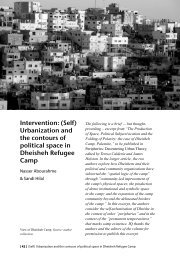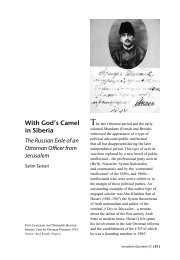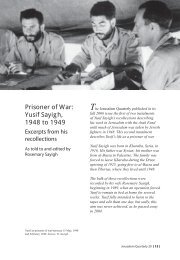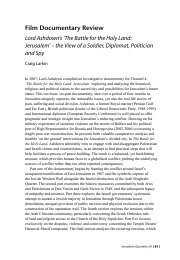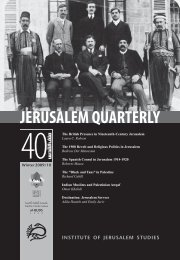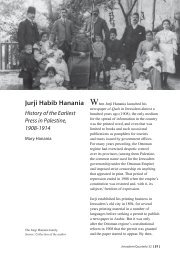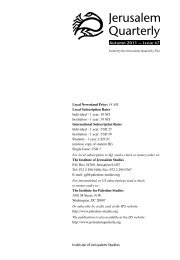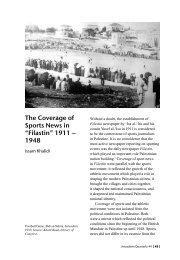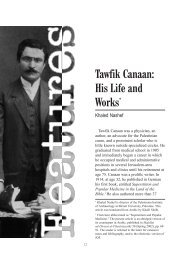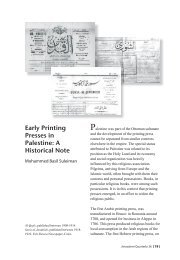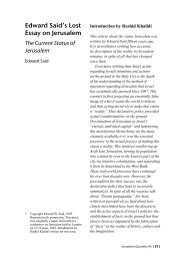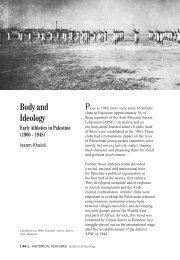PLUNDERING PALESTINE - Jerusalem Quarterly
PLUNDERING PALESTINE - Jerusalem Quarterly
PLUNDERING PALESTINE - Jerusalem Quarterly
Create successful ePaper yourself
Turn your PDF publications into a flip-book with our unique Google optimized e-Paper software.
the collection project had begun – as revealing a man indifferent to the implications<br />
and context of his actions. Where others may see restraint, I mostly find an efficient,<br />
disturbingly cold professionalism. And even if we assume for a moment that Warman,<br />
a product of German education and 19 th -century positivism, yearned for the “good<br />
order of things”, doesn’t this desire itself prompt an uneasy feeling? Furthermore,<br />
Warman’s stated objective was to prevent chaos in the collection of books. There is,<br />
of course, much logic to Warman’s demand that one authority should be appointed to<br />
handle, sort and distribute the books, and it was not unlikely that this authority should<br />
be his own. He himself notes:<br />
The National Library possesses the mechanism most capable of handling<br />
all the problems, which are many and very often complicated, having to<br />
do with these books… [and it also possesses] the biggest catalogue in the<br />
country which makes the bibliographical identification and processing of<br />
the books easier. 11<br />
He adds that, as the books are in Arabic, “the National Library employs the most<br />
experienced expert librarians for this sort of literature, as well. In passing, Warman<br />
also mentions:<br />
The absence of an official authority recognized by the civilian and military<br />
leadership has significantly obstructed and is still obstructing the rescuing<br />
of the books. Among the many difficulties that stand in our way, there<br />
should be mentioned the inappropriate phenomenon of competition between<br />
different public institutions over the find.<br />
Remarkable in this last sentence is not only its rhetoric, which turns the act of<br />
confiscation into an act of ‘rescuing’ and the books themselves into a ‘find’, but<br />
also the matter at hand. It is clear there was a struggle between various institutions<br />
seeking to obtain the books, as well as greed among these institutions (some only<br />
recently founded) and impatience with the appropriation and distribution of the books.<br />
Warman’s appeal “of the most pressing urgency” may have been born, in fact, from his<br />
interest in the prestige of the National Library in a competition with other libraries and<br />
government offices, as well as his own ambitions and professional career.<br />
This document seems to point to some of the book affair’s most obvious<br />
characteristics: a mixture of arrogance, greed and indifference hidden under the<br />
guise of professionalism; the inseparable combination of occupation and passion for<br />
acquiring possessions; a fear of losing books; but also a banality of action, where the<br />
extraordinary becomes an ordinary matter of administration.<br />
[ 12 ] FEATURE Ownerless Objects?



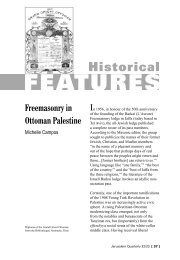
![In Search of Jerusalem Airport [pdf] - Jerusalem Quarterly](https://img.yumpu.com/49007736/1/180x260/in-search-of-jerusalem-airport-pdf-jerusalem-quarterly.jpg?quality=85)
